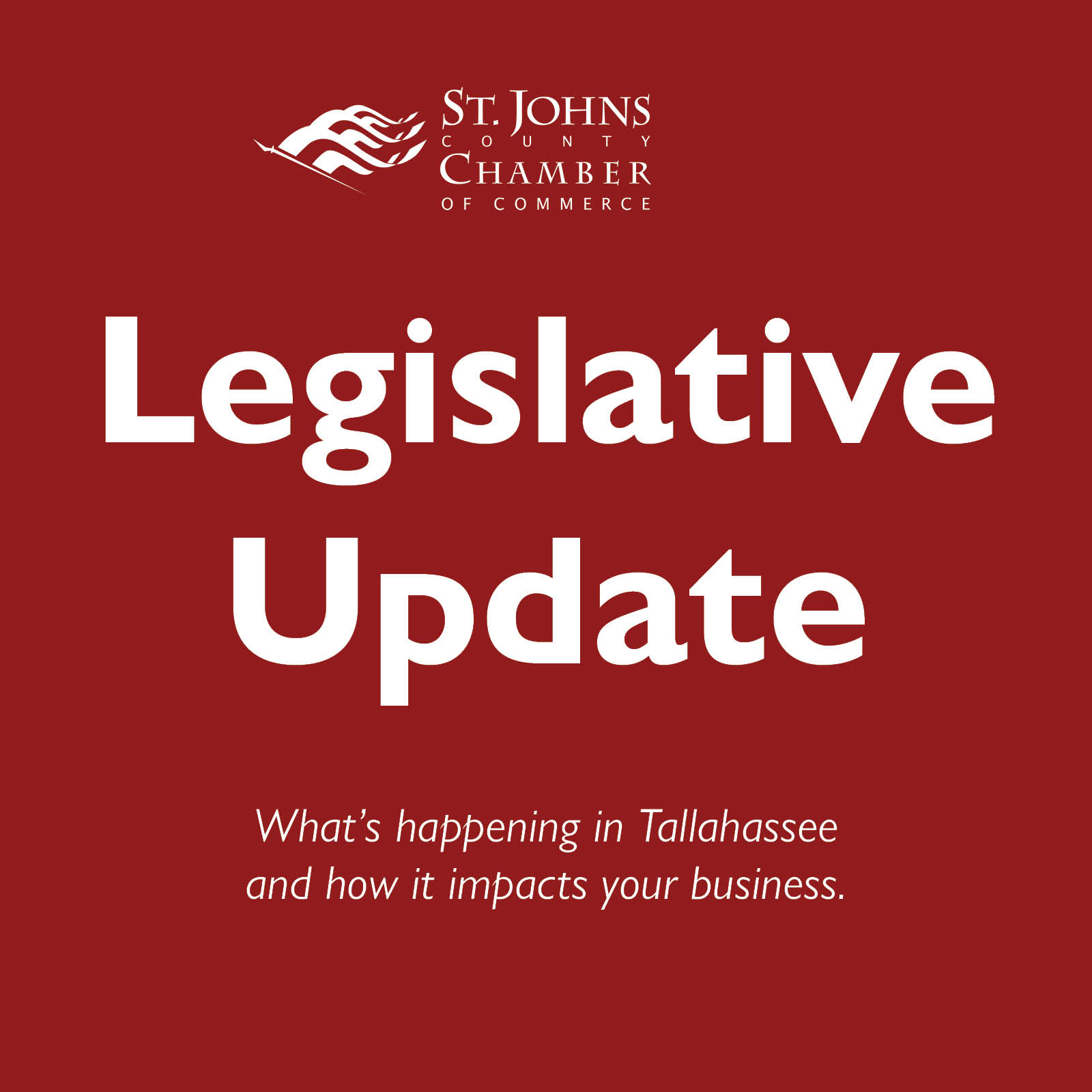2024 SJC Chamber legislative update #2

We are now three-quarters of the way through the 2024 Legislative Session and activity is rapidly picking up as the March 8 end of session looms. There is still a lot of work to be done, including ironing out the differences in the House and Senate budget, the one item required by the Florida Constitution to pass each year.
Below are highlights of the major issues the St. Johns County Chamber of Commerce is actively engaging on over the last few weeks of the legislative session.
Senate unveils tax package
Last week, the Senate Finance and Tax Committee unveiled and advanced its annual tax reduction proposal. The House released its tax package the week before and passed the bill through its second committee, moving it one step closer to setting up negotiations with the Senate. The House proposal provides more than $736 million in tax relief, while the Senate bill proposes $901 million in savings. The tax package is typically the last bill to pass both chambers each year and will be negotiated between the House and Senate over the next two weeks.
Why does this matter? Depending on the outcome of the budget negotiations between the House and Senate, these are pocketbook issues for small businesses. Lower taxes mean more money in your pockets. These are some of the key issues in the bills.
Business Rent Tax
The biggest difference in the two proposals is that the House tax package includes significant progress on a long-standing St. Johns County Chamber priority: the eventual elimination of the state’s sales tax on commercial business leases. Florida remains the only state in the nation that imposes a tax on commercial leases. The House-proposed reduction in the business rent tax from 2% to 1.25% is estimated to provide approximately $340 million in savings to local businesses across the state beginning July 1, 2024. In 2022, the St. Johns County Chamber strongly supported the Florida Legislature’s action to reduce the business rent tax from 5% to 2% by summer 2024. This significant reduction allows for reinvestment back into local communities, local businesses and Florida’s workforce.
Instead of the reduction in the business rent tax, the Senate budget proposal contains Gov. Ron DeSantis’ priority to exempt certain taxes, fees and assessments on residential property insurance policyholders with a policy under $750,000 for one year beginning July 1, 2024, to provide savings to homeowners across the state.
Tourist Development Tax Referendum/Discretionary Sales Tax Referendum
Notably absent from the Senate tax package is a provision requiring periodic reapproval of tourist development taxes by local voters, which is included in the House bill and was subject to significant concern expressed in the House Ways & Means Committee (which includes Rep. Cyndi Stevenson). The Tourist Development Tax (also known as the “bed tax”) is paid primarily by visitors on every night they stay in a hotel or other lodging facility. St. Johns County collected more than $20 million in FY2023, and the funds are used by the county to promote tourism and to provide beach replenishment and a host of other services. The St. Johns County Chamber has voiced our strong opposition to the House provision that would require a referendum every six years on the bed tax, which would divert badly needed funds from tourism promotion and other vital services. After discussing the issue with Rep. Stevenson, she spoke against the passage of this language during the Ways and Means Committee hearing last week.
Why does this matter? Unlike Orlando and Miami, St. Johns County, St. Augustine and Ponte Vedra Beach rely upon the tourist development taxes to bring in more visitors, who in turn spend millions each year supporting our county’s single largest industry. These taxes are collected from predominantly out-of-county and out-of-state tourists, not residents.
Affordable Housing Property Tax Exemptions for Accessory Dwelling Units
Both House and Senate bills amend the local option tax exemption for affordable housing to provide that, in addition to existing options for what properties may receive the exemption, cities and counties may exempt up to 100% of the assessed value of an ADU meeting certain affordable housing requirements.
Live Local Act-related bills
SB 328 and HB 1239 prohibit cities and counties from restricting the floor area ratio as well as density for Live Local proposed developments. They both authorize cities and counties to restrict the height of proposed developments under certain circumstances; make remedial and clarifying changes to property tax exemptions granted by the Live Local Act and appropriate $100 million to the Florida Housing Finance Corporation for the Hometown Heroes Program.
Recent Actions: SB 328 was unanimously passed by the Senate. HB 1239 passed its final committee on Feb. 20 by a 28-1 vote and now heads to the House floor.
Why does this matter? Providing attainable housing in the county is a major SJC Chamber initiative as it keeps our local businesses and workforce growing and thriving.
VISIT FLORIDA funding
A perennial budget battle appears to have been solved on the first day of budget conferences.
The House's first offer brought the chamber in line with the Senate on funding for the state's tourism marketing arm. Visit Florida will receive $80 million overall in the 2024-25 budget, matching the total it received in the current year budget. These are recurring dollars so the funding will continue at this level through 2027, when Visit Florida’s current authorization expires
